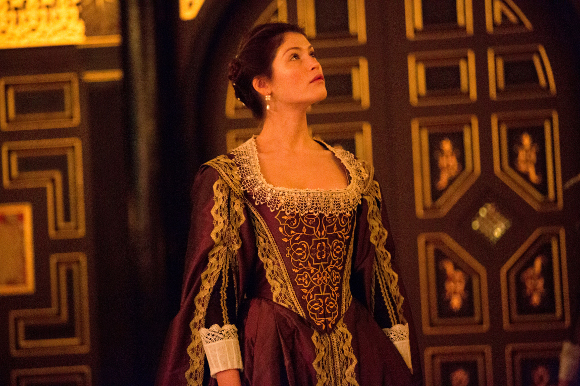The Duchess of Malfi (Sam Wanamaker Playhouse)
The inaugural production in Shakespeare’s Globe’s new indoor venue starring Gemma Arterton opened last night

© Mark Douet
First impressions are tremendous. The £7.5m indoor theatre at Shakespeare’s Globe has opened at last, miraculously contained within the foyer area, like a squashed replica of the great Globe itself: a 340-seater oaken bauble with two horse-shoe galleries, a pit with seating, a minstrel’s gallery, a myriad beeswax candles, affixed to the eleven elegant pillars and on six descendant steel chandeliers (a bit too jerkily operated at the moment) and a painted ceiling of blue sky, clouds and plump little putti.
And the opening play, John Webster’s The Duchess of Malfi (400 years old this year), is perfect: a dark, psychological shocker to be glimpsed in flickering light, a grim tale of a widowed Duchess forbidden new love by her barmy brothers – a lascivious cardinal and a lycanthropic madman – subjected to terrors, forced into exile; with torture, waxen effigies, a severed hand (which bounced like a plastic toy on the shiny oaken stage), grisly onstage strangulation, an open coffin and moonstruck ruins.
The space is almost indecently intimate, less rectangular than I expected, very high, with panels round the first gallery opening for artificial daylight, a square thrust stage, a vomitarium in the pit for switching the focus on entrances and exits… and at the still, sickly centre of the play, Gemma Arterton‘s pellucid Duchess, serenely Oriental, a gorgeous doll with sensuality to burn.
Arterton made her stage debut in the Globe in a delightful Love’s Labour’s Lost seven years ago. The Bond girl, half way to maturity, must indeed experience a quantum of solace in returning to so actor- (and audience-) friendly an environment; although there must be a strong sense of frying pan and fire for one who suffered all that sadistic bedroom humiliation in The Disappearance of Alice Creed.
Here, then, are epic possibilities in a tiny room, and Dominic Dromgoole‘s production – entirely lit by candles and cleverly designed by Jonathan Fensom – facilitates an ease of speaking so that we hear Webster’s sinuous and glittering verse like never before. Granted, Arterton may not pack the tragic punch of Helen Mirren or Eve Best in this role, but I’ve never experienced her good-hearted innocence beset by warped treatment so well.
The brothers are superbly cast, James Garnon‘s understated smarminess as the Cardinal perfectly matched to the space while David Dawson‘s ferocious, skewed Ferdinand is daringly stymied with emotional stutters. Sean Gilder is a solid, bass-voiced Bosola, the court gall who spies on the Duchess, and Alex Waldmann as her lower class lover, the steward Antonio, makes dull devotion interesting bordering on sexy.
There are very few cuts, but the play still speeds by in under three hours; just as well, as the slim, thinly padded benches are slightly penitential. Lords, courtiers and “the wild consort of madmen” are efficiently despatched by Giles Cooper, John Dougall, Brendan O’Hea and Dickon Tyrrell. Paul Rider is a beacon of common sense as Antonio’s friend, Delio, and Denise Gough outstandingly good and supremely watchable as Julia, the Cardinal’s mistress, who gives sexual appetite full rein and tastes her own death in a missal.












